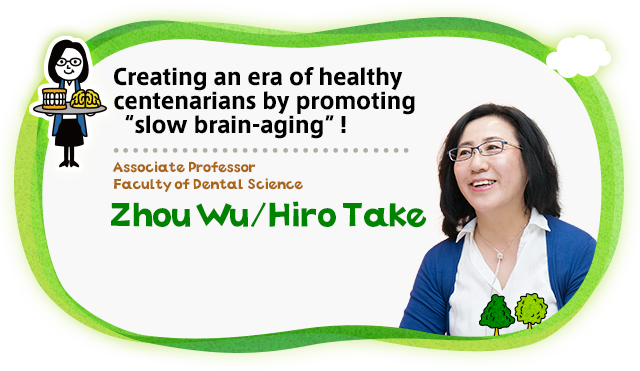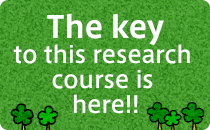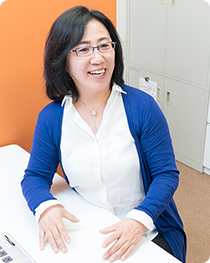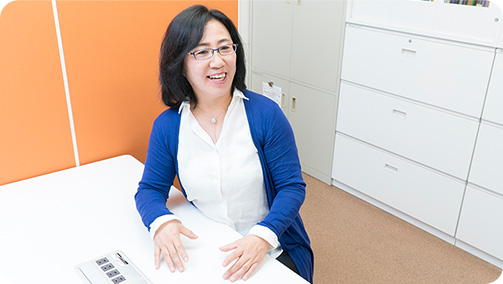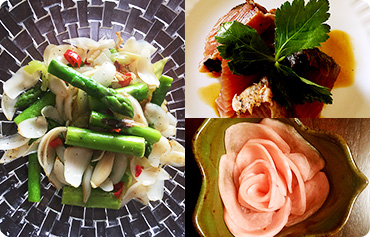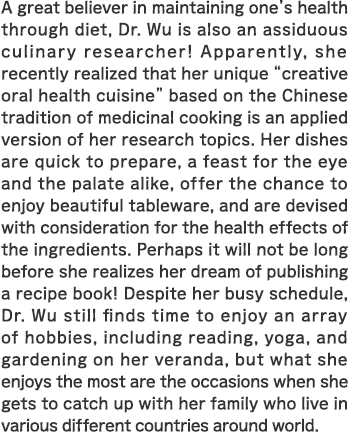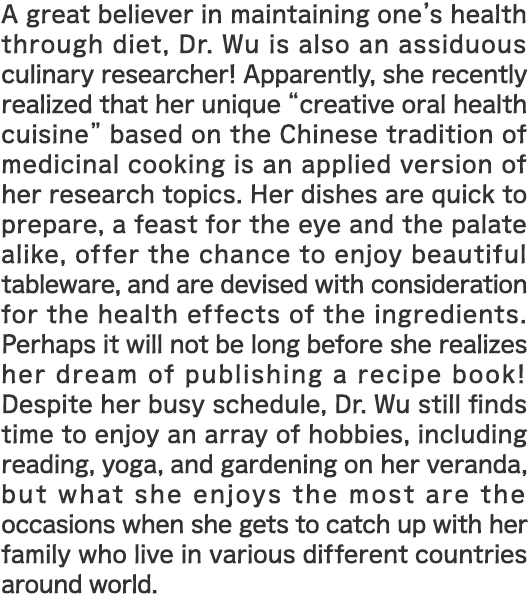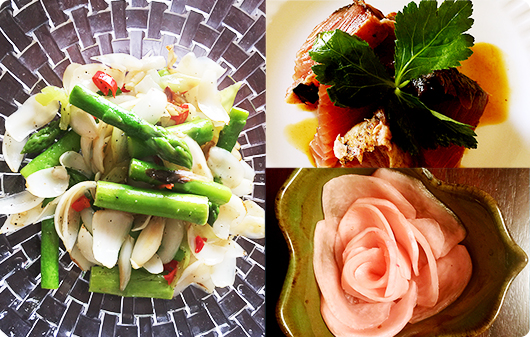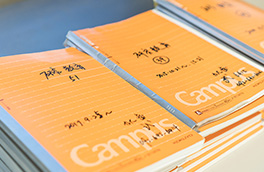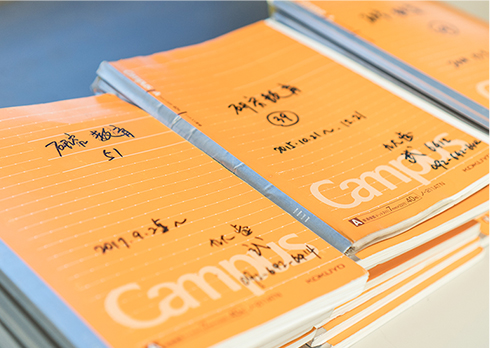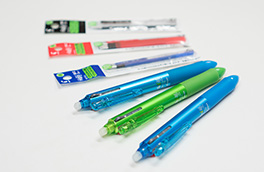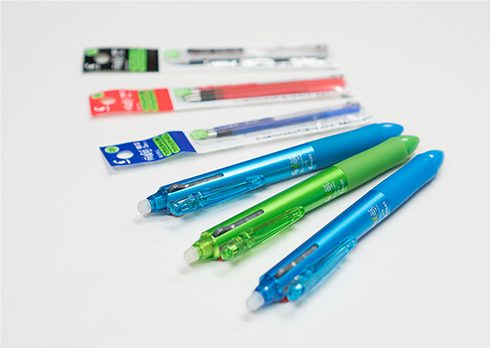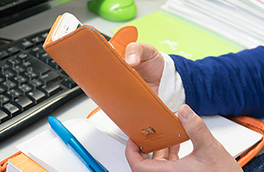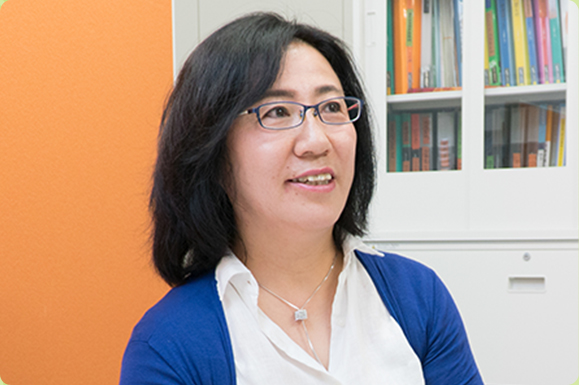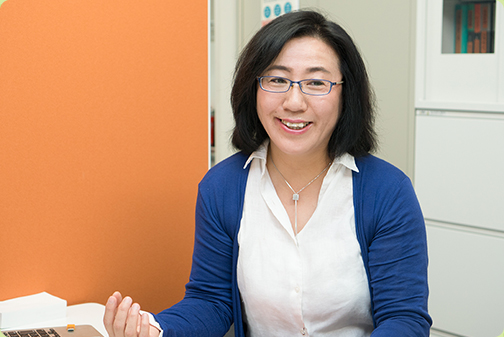 “My favorite color is orange, because it cheers me up!” says by Dr. Wu, who spoke in a brisk, bright tone. The interview was full of laughter from beginning to end.
“My favorite color is orange, because it cheers me up!” says by Dr. Wu, who spoke in a brisk, bright tone. The interview was full of laughter from beginning to end.
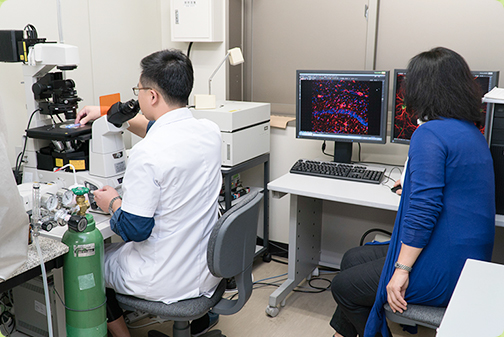 “Discoveries by eyes” form the starting point for research. After that, it is a matter of steady, tireless observations every day. Dr. Wu projects the microscope images of the histology onto a monitor and examines them in detail.
“Discoveries by eyes” form the starting point for research. After that, it is a matter of steady, tireless observations every day. Dr. Wu projects the microscope images of the histology onto a monitor and examines them in detail.
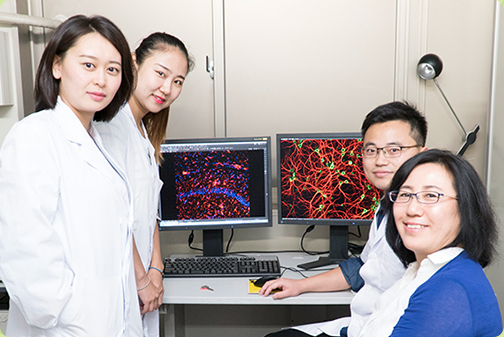 Members of the research project. Young academic staff and highly motivated international students apply diligently and learn from each other as they make progress in the researches.
Members of the research project. Young academic staff and highly motivated international students apply diligently and learn from each other as they make progress in the researches.
 “My favorite color is orange, because it cheers me up!” says by Dr. Wu, who spoke in a brisk, bright tone. The interview was full of laughter from beginning to end.
“My favorite color is orange, because it cheers me up!” says by Dr. Wu, who spoke in a brisk, bright tone. The interview was full of laughter from beginning to end.
You might be surprised to discover that the teeth and the brain are linked but recent clinical research in Western countries has found a correlation between periodontal disease and dementia, with reports that elderly people who have severe periodontal disease are more prone to dementia and that the progression of the disease is faster in dementia patients who have periodontal disease. There was also the startling discovery of the periodontal disease bacterium Porphyromonasgingivalis (Pg) and bacterial components called lipopolysaccharides (LPS) in the brains of deceased Alzheimer's patients, however, the precise mechanism and causal relationship between them is unknown.
 “Discoveries by eyes” form the starting point for research. After that, it is a matter of steady, tireless observations every day. Dr. Wu projects the microscope images of the histology onto a monitor and examines them in detail.
“Discoveries by eyes” form the starting point for research. After that, it is a matter of steady, tireless observations every day. Dr. Wu projects the microscope images of the histology onto a monitor and examines them in detail.
I started down this research path when I began researching chronic systemic inflammation as a graduate student. After my appointment as assistant professor, I started conducting research into the brain in my current laboratory, which was the catalyst for my setting up a new research project linking systemic inflammation with the brain. So far, using a rat model, I've discovered a new route of systemic inflammation signals are transmitted to the brain through meninges — the membrane covering the brain — and found that chronic systemic inflammation causes severe brain inflammation(neuroinflammation)in the middle-aged rats. I've further spent four years proving that neuroinflammation caused by systemic inflammation reduces memory function in the middle-aged rats. Alzheimer's disease is the most common form of dementia and its incidence increases sharply with age. Since 2011, I've been conducting joint research with a leading expert in the field of Alzheimer's research, Professor Patrick McGeer of the University of British Columbia in Canada, and have been joined in the researches of Alzheimer's disease in earnest. Recently, a new hypothesis has been put forward which suggests that Alzheimer's disease might cause by chronic neuroinflammation. The research concept that I have steadily been working on for many years — namely, that chronic systemic inflammation causes neuroinflammation and reduces cognitive function — is completely consistent with research concepts at the forefront of Alzheimer's disease research.
 Members of the research project. Young academic staff and highly motivated international students apply diligently and learn from each other as they make progress in the researches.
Members of the research project. Young academic staff and highly motivated international students apply diligently and learn from each other as they make progress in the researches.
As I regarded periodontal disease as chronic systemic inflammation, my research naturally developed into unraveling the mechanism of periodontal disease's involvement in Alzheimer's disease. According the word “Slow but steady wins the race,” after more than three years of work, we've recently discovered that chronic systemically exposure of PgLPS induced the Alzheimer-like pathologies in the middle-aged mice, including learning and memory deficit, microglia-mediated neuroinflammation and accumulation of amyloid β in neurons. In addition, using gene-deficient mice, we ascertained that cathepsin B is the enzyme that plays a critical role in the Alzheimer-like pathology caused by PgLPS. The discovery was the first to demonstrate the possibility that chronic periodontal disease might cause dementia from middle age, so it's attracting attention.
As an extension of my work in unraveling the pathological mechanism, I'm also searching for natural substances that can curb inflammation. So far, we've identified the effects of the phospholipid phosphatidylserine and other liposomes in inhibiting inflammatory bone destruction, conducted joint research with Japanese private sector companies and researchers overseas that revealed the effects of propolis in suppressing microglia-mediated neuroinflammation, and shed light on the neuron-protecting effects of propolis and of natural herbal materials from Tibet. I do determine to feed back the results of our work to the society by commercializing the fruits of the basic research. In the future, I'm planning to conduct research aimed at developing function food, however, food and drug development take a very long time. First of all, I want to spread the message about oral care habits that will prevent periodontal disease.

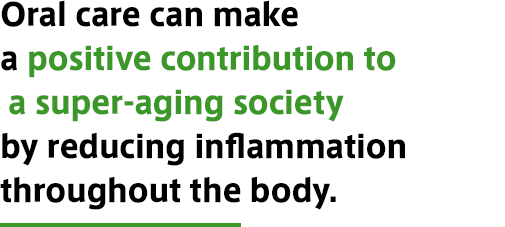
Periodontal disease is a chronic inflammation of the periodontal tissue that supports the teeth, and is the main cause of tooth loss in adults. However, few patients undergo ongoing treatment because periodontal disease causes little pain.So people either don't notice it or, if they do, they don't seek treatment. Many people think that losing teeth is just part of aging.
Japan has become a super-aging society, the whole country is advocating the importance of preventive medicine. The pace of aging is also accelerating worldwide, with forecasts suggesting that the number of elderly people will exceed 100 million across the globe within the next 20 years, accompanied by a surge in the number of dementia patients. It's estimated that delaying onset by five years could halve the number of dementia patients with Alzheimer's disease. In light of the fact that periodontal disease causes dementia, preventing inflammation throughout the body by means of oral care will likely help to both prevent and delay the onset of dementia.
Rather than “anti-aging,” which means resisting aging, I believe that our mission as researchers is to undertake more in-depth study of “slow brain-aging,” which involves aging healthily by reducing inflammation throughout the body. We should then promote widespread application of the results worldwide. As a nation famed for its longevity, Japan should strive to become a powerhouse of healthy life expectancy and serve as a role model for the world. A key part of my work's appeal is the chance to make a contribution to aged societies across the globe by undertaking cutting-edge research in the country with the world's highest life expectancy and disseminating the results worldwide in the form of “oral brain science.”
![]()
![]()




